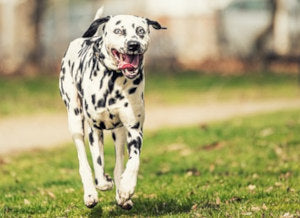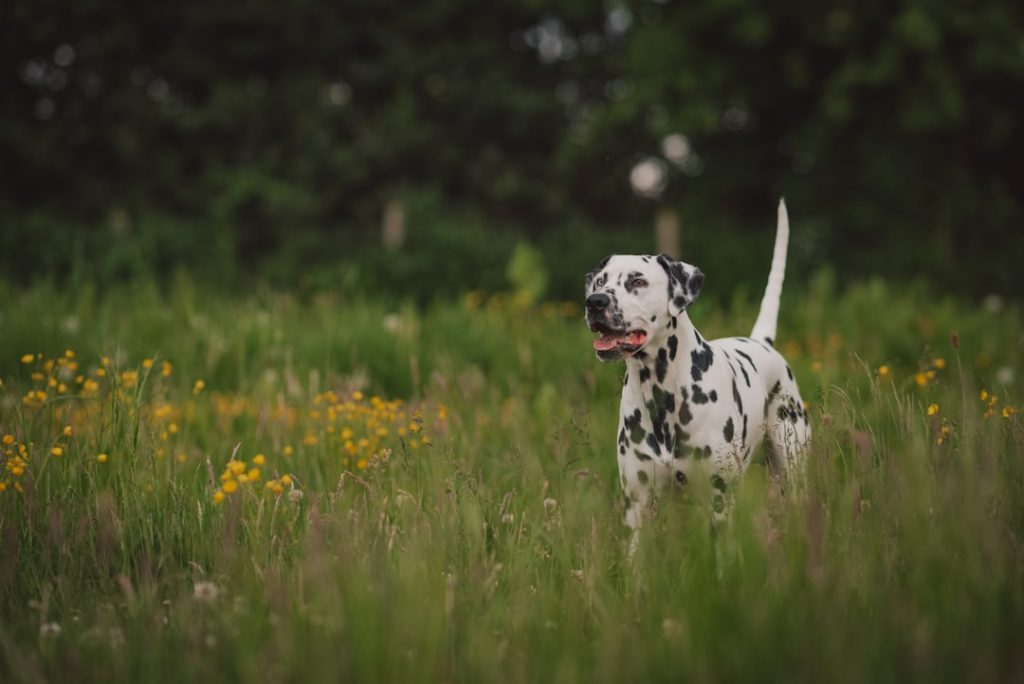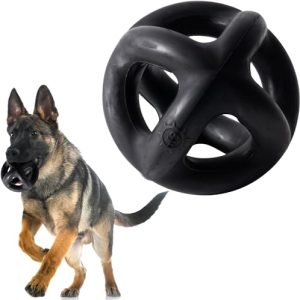Are you curious about what makes a Dalmatian dog so special? If you’ve ever seen those unique black-spotted coats and wondered about their personality, history, or care needs, you’re in the right place.
This article will give you clear, simple insights into everything you want to know about Dalmatians. By the end, you’ll understand why these dogs are more than just eye-catching—they might just be the perfect companion for you. Keep reading to discover the charm behind every spot!
Dalmatian Origins
The Dalmatian dog is known worldwide for its unique spotted coat. Its origins are rich and full of mystery. Understanding where this breed comes from helps appreciate its traits and history.
Historical Background
The Dalmatian’s history dates back several centuries. Early images and records show spotted dogs in Europe. These dogs were often seen with horse carriages. They served as guard dogs and companions. Some historians link them to the Dalmatian region in Croatia. The name “Dalmatian” likely comes from this area. The breed was popular among nobility and soldiers alike. It became famous in England during the 1800s. The Dalmatian was a symbol of status and elegance.
Breed Development
Breeders focused on preserving the Dalmatian’s unique spots and shape. The breed was developed for endurance and speed. It needed to run alongside horses for long distances. Early breeding aimed to maintain their strong, muscular build. Over time, the Dalmatian gained recognition in dog shows. Selective breeding helped improve their coat pattern consistency. The breed’s temperament was also shaped for loyalty and alertness. Today, Dalmatians are both family pets and show dogs. Their origins influence their appearance and behavior.
Physical Traits
Discovering the physical traits of a Dalmatian can be as exciting as watching them play in the park. Known for their unique appearance, these dogs have some of the most striking features you’ll find in the canine world. Let’s dive into what makes them so visually appealing.
Distinctive Coat Patterns
One of the first things you’ll notice about a Dalmatian is their stunning coat pattern. The contrast of their black or liver spots on a white background is not just eye-catching, but iconic. No two Dalmatians have the same pattern, making each one a unique work of art.
These spots start to develop when they are around two weeks old. This gradual transformation is something many dog owners find fascinating. Have you ever wondered how your Dalmatian’s coat might look as they grow?
Size And Build
Dalmatians are medium-sized dogs that exude elegance and strength. They typically weigh between 45 to 70 pounds, with a height ranging from 19 to 24 inches. This robust build makes them great runners and active companions.
Their muscular physique is complemented by their smooth, glossy coat. If you’ve ever taken a Dalmatian for a jog, you know how they love to stretch their legs and show off their agility.
Eye And Ear Characteristics
The eyes of a Dalmatian can captivate anyone. They can be brown, blue, or even one of each, adding to their unique appearance. These expressive eyes often convey curiosity and playfulness.
In addition to their eyes, Dalmatians have medium-sized ears that are set high and carried close to the head. Their ears are soft to the touch, often with spots that add to their charm. Have you ever noticed how a Dalmatian’s ears perk up when they hear something interesting?
Temperament And Behavior
Dalmatians are known for their unique spots and lively nature. Their temperament and behavior make them a special breed. Understanding these traits helps owners provide the best care and training. Dalmatians have a mix of energy, social skills, and intelligence that shape their daily life.
Energy Levels
Dalmatians have very high energy. They need lots of exercise each day. Without activity, they can become bored and restless. Long walks, runs, or play sessions keep them happy. Energy helps them stay fit and healthy. This breed loves to be active and outdoors.
Social Nature
Dalmatians enjoy being with people and other animals. They are friendly and often playful. They like attention and can be very loyal. Early socialization helps them get along well with others. They do not like being left alone for long. Their social nature makes them great family pets.
Intelligence And Training
Dalmatians are smart dogs. They learn commands quickly and enjoy challenges. Training should be consistent and positive. Harsh methods do not work well with them. Mental stimulation is important to prevent boredom. Puzzle toys and new tricks keep their minds sharp. They respond best to reward-based training methods.
Credit: www.pets4homes.co.uk
Health Concerns
Dalmatian dogs are known for their unique spots and lively spirit. They bring joy but also face specific health challenges. Understanding these health concerns helps owners keep their pets safe and happy. Early care can improve a Dalmatian’s quality of life significantly.
Common Genetic Issues
Dalmatians often inherit certain health problems. Deafness affects many, with one or both ears impacted. Urinary stones are another issue due to their unique metabolism. Hip dysplasia can cause joint pain and mobility problems. These genetic issues require attention from breeders and owners.
Preventive Care
Regular vet visits help catch problems early. Routine hearing tests are important for young Dalmatians. A balanced diet can reduce the risk of urinary stones. Exercise keeps joints strong and muscles healthy. Avoid overfeeding to maintain a healthy weight. Vaccinations and parasite control protect overall health.
Signs To Watch For
- Difficulty hearing or not responding to sounds
- Frequent licking or biting of paws
- Straining or pain during urination
- Stiffness or limping after exercise
- Loss of energy or appetite
- Sudden changes in behavior or mood
Noticing these signs early allows prompt care. Always consult a vet if you observe any symptoms.
Exercise Needs
Dalmatians are known for their boundless energy and striking appearance, but meeting their exercise needs is essential to keep them happy and healthy. These dogs thrive on regular physical activity that challenges both their body and mind. Understanding how much exercise your Dalmatian requires helps prevent behavioral issues and supports their overall well-being.
Daily Activity Requirements
Your Dalmatian needs at least 1 to 2 hours of exercise each day. This can be split into multiple sessions, such as morning and evening walks. Without enough activity, they can become restless, leading to destructive habits around the house.
Think about your daily routine—can you commit to this level of activity? Dalmatians are not couch potatoes; they demand movement to stay balanced.
Suitable Activities
Running and jogging are excellent ways to burn off your Dalmatian’s energy. They also enjoy games like fetch, which combine speed and agility. Swimming can be a great low-impact option, especially if your dog has joint sensitivities.
- Long brisk walks
- Agility training courses
- Interactive fetch sessions
- Swimming or water play
- Hiking on dog-friendly trails
Have you tried mixing these activities to keep your Dalmatian engaged? Variety can prevent boredom and keep exercise fun for both of you.
Mental Stimulation
Physical exercise alone isn’t enough. Dalmatians are intelligent dogs that need mental challenges to avoid boredom. Puzzle toys, obedience training, and scent games can stimulate their minds effectively.
For example, I once introduced a simple treat-dispensing toy to my Dalmatian, and it transformed her energy from restless pacing to focused play. What mental games have you tried that your dog loves?

Credit: walkinpets.com
Diet And Nutrition
A Dalmatian’s diet plays a big role in keeping it healthy and full of energy. Proper nutrition supports its active lifestyle and unique needs. Knowing what to feed your Dalmatian helps avoid health problems and keeps its coat shiny and skin healthy.
Balanced Diet Essentials
Dalmatians need a diet rich in protein and low in purines. Too many purines can cause urinary issues. Choose high-quality dog food with:
- Lean meats like chicken or turkey
- Whole grains such as brown rice or oats
- Vegetables like carrots and peas for vitamins
- Healthy fats from fish oil or flaxseed
Make sure meals provide enough calories for their energy. Fresh water should always be available.
Food Allergies And Sensitivities
Dalmatians can develop allergies or food sensitivities. Watch for signs like itching, redness, or stomach upset. Common allergens include:
- Beef
- Dairy products
- Wheat
- Chicken
Switch to hypoallergenic or limited-ingredient diets if needed. Consult your vet for allergy testing and advice.
Feeding Schedule
Feed your Dalmatian twice a day to keep energy steady. Avoid free feeding to prevent overeating. Measure portions carefully based on age and activity.
Keep feeding times consistent. This helps with digestion and house training. Puppies need more frequent meals, usually three to four times daily.
Grooming Tips
Grooming a Dalmatian keeps it healthy and looking great. Their short coat needs regular care to avoid shedding and skin issues. Proper grooming also helps spot any health problems early. A clean, well-groomed Dalmatian feels comfortable and happy.
Coat Care
Brush the Dalmatian’s coat twice a week using a firm bristle brush. This removes loose hair and spreads natural oils. Their short hair can shed a lot, so daily brushing helps control it. Check for ticks, fleas, or skin irritations during brushing sessions.
Bathing Frequency
Bathe your Dalmatian every 4 to 6 weeks. Use a mild dog shampoo to protect their skin. Avoid over-bathing, which can dry out the coat and skin. Rinse thoroughly to remove all shampoo and prevent irritation.
Nail And Ear Maintenance
- Trim nails every 3 to 4 weeks to avoid overgrowth and discomfort.
- Use a nail clipper designed for dogs to prevent splitting.
- Clean ears weekly with a vet-approved ear cleaner.
- Check ears for redness, odor, or discharge as signs of infection.
- Keep ears dry to reduce the risk of infections.

Credit: www.trupanion.com
Training Strategies
Training a Dalmatian requires patience and clear strategies. These dogs are intelligent and energetic. They respond well to consistent and positive training approaches. The right methods help build a strong bond and encourage good behavior. Below are key strategies to train your Dalmatian effectively.
Positive Reinforcement
Use treats and praise to reward good behavior. This motivates your Dalmatian to repeat actions. Keep training sessions short and fun. Avoid punishment, which can cause fear or confusion. Consistency is vital; reward the desired behavior every time.
Socialization Techniques
Introduce your Dalmatian to different people and animals early. This reduces fear and aggression later on. Use calm and gentle interactions during socialization. Take your dog to parks, pet-friendly stores, or friend’s homes. Positive experiences help your Dalmatian stay friendly and confident.
Handling Stubbornness
Dalmatians can be strong-willed and stubborn. Stay calm and patient during training. Use firm but kind commands. Break tasks into small steps to avoid frustration. Keep training sessions consistent and regular. Redirect unwanted behavior with distractions or alternative activities.
Living With A Dalmatian
Living with a Dalmatian means inviting a bundle of energy and personality into your home. These dogs are known for their striking looks and lively spirit, but they also require a lifestyle that matches their needs. Understanding what suits a Dalmatian best will help you create a happy and healthy environment for both you and your furry friend.
Suitable Home Environment
Dalmatians thrive in homes where they have enough space to move around freely. A house with a fenced yard is ideal because they love to run and explore. If you live in an apartment, be prepared to provide multiple daily walks and active play sessions to keep them stimulated.
These dogs are sensitive to extreme weather, so ensure your home offers a comfortable temperature year-round. Cold winters or hot summers can be tough on their short coats. Do you have a spot in your home that can become their cozy retreat?
Family Compatibility
Dalmatians can be great family dogs if everyone is ready for their high energy levels. They bond closely with their owners and enjoy being part of daily activities. However, their exuberance means they may not be the best fit for families with very young children unless supervised carefully.
If your family enjoys outdoor adventures, a Dalmatian will likely fit right in. They respond well to clear boundaries and consistent training, which helps prevent behavioral issues. How does your family handle active pets and training routines?
Travel And Outdoor Considerations
Taking a Dalmatian on trips requires planning. Their need for exercise means long car rides should include frequent breaks for stretching and bathroom stops. Many owners find that Dalmatians enjoy hiking and outdoor activities, but always check the trail’s suitability and weather conditions.
When traveling, bring essentials like water, a bowl, and a favorite toy to keep your dog comfortable. Some Dalmatians can be sensitive to new environments, so gradual introductions can ease stress. Are you ready to include your Dalmatian in your travel plans with thoughtful preparation?
Frequently Asked Questions
What Are The Key Traits Of A Dalmatian Dog?
Dalmatians are energetic, intelligent, and friendly dogs. They have a unique spotted coat and require regular exercise. They are loyal and good family pets but need early socialization and training.
How Long Do Dalmatian Dogs Typically Live?
Dalmatian dogs usually live between 10 to 13 years. Proper care, diet, and regular vet check-ups can help extend their lifespan.
Are Dalmatians Good With Children And Families?
Yes, Dalmatians are generally good with children and families. They are playful and protective but need supervision around young kids due to their energetic nature.
What Is The Ideal Diet For A Dalmatian Dog?
A Dalmatian’s diet should be high-quality, balanced, and rich in protein. Avoid foods high in purines to prevent urinary issues common in this breed.
Conclusion
Dalmatian dogs are unique with their spotted coats and friendly nature. They enjoy exercise and need regular walks. These dogs love being part of a family and thrive on attention. Training them early helps build good habits. They can be great pets for active people.
Their playful spirit brings joy to any home. Caring for a Dalmatian means giving time and love. A Dalmatian’s charm and energy make it a special companion. Choosing this breed means enjoying loyalty and fun every day.

Emily Barker is the founder of ChillDogLife.com, a space dedicated to helping pup parents discover the best dog products, lifestyle tips, and cozy ideas for happier homes.
A lifelong dog lover, Emily combines her passion for pets with a knack for research to share trusted recommendations on everything from toys and furniture to health and everyday care.
Her goal is simple: to make life easier, stylish, and more joyful for dogs and the people who love them.







